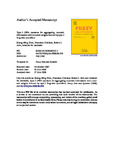Type-1 OWA operators for aggregating uncertain information with uncertain weights induced by type-2 linguistic quantifiers
| dc.contributor.author | Zhou, Shang-Ming | |
| dc.contributor.author | Chiclana, F | |
| dc.contributor.author | John, RI | |
| dc.contributor.author | Garibaldi, JM | |
| dc.date.accessioned | 2023-02-15T13:13:46Z | |
| dc.date.available | 2023-02-15T13:13:46Z | |
| dc.date.issued | 2008-12 | |
| dc.identifier.issn | 0165-0114 | |
| dc.identifier.issn | 1872-6801 | |
| dc.identifier.uri | http://hdl.handle.net/10026.1/20374 | |
| dc.description.abstract |
The OWA operator proposed by Yager has been widely used to aggregate experts' opinions or preferences in human decision making. Yager's traditional OWA operator focuses exclusively on the aggregation of crisp numbers. However, experts usually tend to express their opinions or preferences in a very natural way via linguistic terms. These linguistic terms can be modelled or expressed by (type-1) fuzzy sets. In this paper, we define a new type of OWA operator, the type-1 OWA operator that works as an uncertain OWA operator to aggregate type-1 fuzzy sets with type-1 fuzzy weights, which can be used to aggregate the linguistic opinions or preferences in human decision making with linguistic weights. The procedure for performing type-1 OWA operations is analysed. In order to identify the linguistic weights associated to the type-1 OWA operator, type-2 linguistic quantifiers are proposed. The problem of how to derive linguistic weights used in type-1 OWA aggregation given such type of quantifier is solved. Examples are provided to illustrate the proposed concepts. Crown Copyright © 2008. | |
| dc.format.extent | 3281-3296 | |
| dc.language | en | |
| dc.language.iso | en | |
| dc.publisher | Elsevier BV | |
| dc.subject | Aggregation | |
| dc.subject | OWA operator | |
| dc.subject | Type-1 OWA operator | |
| dc.subject | Type-2 fuzzy sets | |
| dc.subject | Type-2 linguistic quantifiers | |
| dc.subject | Soft decision making | |
| dc.title | Type-1 OWA operators for aggregating uncertain information with uncertain weights induced by type-2 linguistic quantifiers | |
| dc.type | journal-article | |
| dc.type | Journal Article | |
| plymouth.author-url | https://www.webofscience.com/api/gateway?GWVersion=2&SrcApp=PARTNER_APP&SrcAuth=LinksAMR&KeyUT=WOS:000260652000004&DestLinkType=FullRecord&DestApp=ALL_WOS&UsrCustomerID=11bb513d99f797142bcfeffcc58ea008 | |
| plymouth.issue | 24 | |
| plymouth.volume | 159 | |
| plymouth.publication-status | Published | |
| plymouth.journal | Fuzzy Sets and Systems | |
| dc.identifier.doi | 10.1016/j.fss.2008.06.018 | |
| plymouth.organisational-group | /Plymouth | |
| plymouth.organisational-group | /Plymouth/Faculty of Health | |
| plymouth.organisational-group | /Plymouth/Faculty of Health/School of Nursing and Midwifery | |
| plymouth.organisational-group | /Plymouth/REF 2021 Researchers by UoA | |
| plymouth.organisational-group | /Plymouth/REF 2021 Researchers by UoA/UoA03 Allied Health Professions, Dentistry, Nursing and Pharmacy | |
| plymouth.organisational-group | /Plymouth/Users by role | |
| plymouth.organisational-group | /Plymouth/Users by role/Academics | |
| dc.identifier.eissn | 1872-6801 | |
| dc.rights.embargoperiod | Not known | |
| rioxxterms.versionofrecord | 10.1016/j.fss.2008.06.018 | |
| rioxxterms.licenseref.uri | http://www.rioxx.net/licenses/all-rights-reserved | |
| rioxxterms.type | Journal Article/Review |


